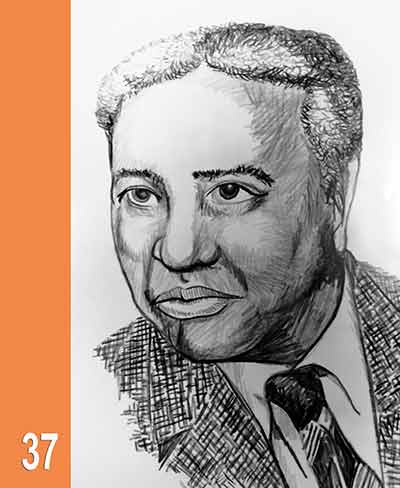William Bennett Scott, Sr.
Induction Year:¬Ý1979
Lived:¬Ý1821-1885
Papers: The Colored Tennessean, Nashville; The Maryville Republican
William Bennett Scott Sr. earned his place in Tennessee newspaper history by being the first black person to publish a newspaper in the state and by publishing the only newspaper in Blount County for ten years. Scott set an example for future black journalists in Tennessee by striking out on his own in the immediate post-Civil War era. His professional accomplishments stand not only as a contribution to Tennessee newspaper history but to the 100-year struggle for equal rights after the Civil War as well.
Scott was born in about 1921 to a white mother and black father in North Carolina. He was a free black in the pre-Civil War South, and he learned the saddle and harness-making trade in Statesville, N.C. In 1847, when he was about 26, increased racial tension as a result of the Nat Turner Rebellion led him to relocate to more racially friendly east Tennessee.
For the next 13 years, Scott developed his saddle and harness business in the Quaker community of Friendsville, in east Tennessee. Shortly before the start of the Civil War, though, hostilities directed towards local free blacks forced him to seek refuge in the larger city of Knoxville, where he remained for the war's duration. There, he and his family were sponsored by the Rev. Thomas W. Hughes, rector of St. John's Episcopal Church and former editor of the Knoxville Register, who arranged for Scott and his son to learn the printing trade.
Immediately after the end of the war in 1865, Scott and his son headed to Nashville to launch the Colored Tennessean, the first newspaper published by a black in Tennessee. In a little more than a year, Scott and his son moved their printing operation to Maryville, where Scott was known to many people in the community.
There, in 1868, he published the inaugural issue of the Maryville Republican and for the next ten years, except for brief spells of competition, it was the only newspaper in Blount County. Scott soon relinquished control of the paper to his son so he could tend to his saddle and harness store, but he continued to exert an editorial influence. In 1878, his paper became the Maryville Democrat.
In addition to establishing a newspaper and running a leather goods shop, Scott found time for civic offices and duties. In the presidential campaign of 1876, Scott supported the Democratic ticket because he felt it would help form a closer political alliance with blacks and whites, and he was called on to make speeches for candidate Samuel J. Tilden in Indiana and Ohio. In his hometown of Maryville, Scott was elected mayor in 1869 and served in this office for one year.
A more important contribution he made to the city of Maryville, however, involved his part in founding one of the first schools for blacks in east Tennessee--the Freedman's Normal Institute. Scott helped organize a community drive and obtain outside funding to build this ten-room schoolhouse, which operated in Maryville for 30 years until funding ran out. Educator Booker T. Washington remarked of the school: ". . . I was constantly coming in contact with those who finished the course of Normal Training at Freedman's Normal Institute. . . . I received great inspiration from them, and felt perhaps no school in the South at that period was doing better work."
Scott continued to remain active as a civic leader in Maryville, serving on many boards, for the rest of his life. He died on Jan. 22, 1885, and is remembered as both an early leader in Tennessee newspaper journalism and an important citizen in the state's history.
